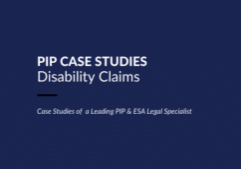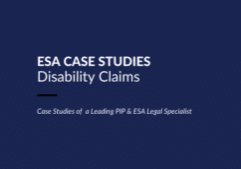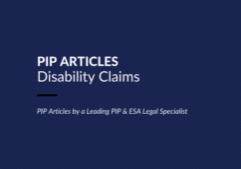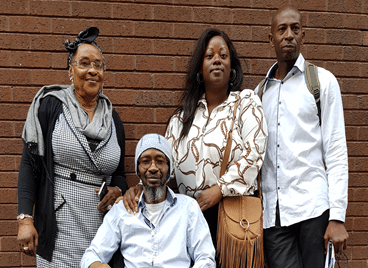A good outcome, with the client receiving exactly the award that we wanted..
Diana and her husband live in Suffolk and came to us for help with the move from DLA to PIP. Her award at DLA was higher rate mobility and the highest rate of the care component and this was an indefinite award where she was last assessed by the Department in 2002. She suffers with COPD, emphysema, bronchitis, eczema, a bilateral hearing loss and has two fractures to her spine. Diana signed her PIP claim form, posted it to us and we completed it together in April of this year. Our view was that she should score a minimum of four points for Preparing food and that the reality is that she cannot prepare and cook simple meal, so should score 8 points for this part of the test. Even when sitting, Diana has to support herself on her arms in order to take pressure off her spine and moving around her home, she has to rely on furniture, door frames and worktop etc. Because she used to be affected by cooking fumes and had to take more medication as a result, she stays out of the kitchen when cooking is going on and for this combination of reasons, we said that the descriptor that reads, Cannot prepare and cook food, was a good fit for her.
Because Diana struggles to get some of the medication out of the blister packs and she cannot get the lid off another, we were confident of her scoring 1 point for her need of assistance to manage medication. She regularly needs help to turn the oxygen cylinder on or off. She was also forgetting to turn the supply off because she finds struggling to breathe to be very distracting. Our advice was that this assistance with oxygen therapy should lift her score this part of the test from 1 to 2 points. With Washing & bathing, the strongest claim was for 3 points because of the need for assistance to get in or out of a bath. Diana had a grant to cover conversion to a wet room, so there is no bath. Despite this, the question of whether Diana could get into and out of an unadapted bath without assistance is still relevant. Case law from the Upper Tribunal in 2016 pointed out that an inability to get in or out of a bath, or a shower, will trigger the 3 points. Washing and bathing is a physical task and not surprisingly, Diana's breathing is affected. The whole process takes her nearly an hour and she then needs to use oxygen and lie down to recover. Arguably, 8 points could have been scored under the heading of Washing & bathing because she cannot achieve the task within a reasonable time period, applying regulation 4(2A).
Rails were provided as part of her grant work to get her back to her feet after using the toilet and her claim to 2 points for the need to use an aid or appliance was strong. When it came to Dressing & undressing, Diana is one of the people who has to sit to do this. Case law tells us that whatever she sits on cannot count as an aid or appliance because many people who do not have a disability also need to sit down for this purpose. However, she has to use a cabinet to get back to her feet and the cabinet counts as an aid because people who do not have a disability are able to get to their feet without using anything.
Diana wears two hearing aids, prescribed by the hospital and we had no doubt that 2 points would be awarded for Communicating verbally.
Diana's claim under the heading of Planning & following journeys was a little out of the ordinary. The issue for her is that she never knows when her breathing will worsen. It has been triggered by wind, cold, vehicle fumes and grass being cut nearby, and so she is understandably anxious. The person with her does not really have a role but they provide reassurance simply by being there. Again, there is case law from the Upper Tribunal saying that passive reassurance is enough to trigger points for being unable to follow the route of even a familiar journey without another person. Another Upper Tribunal decision states that the anxiety has to be strong if points are to be scored on this part of the test; the threshold is a high one. That case instructed us to read the words “to avoid overwhelming psychological distress” into the descriptors, even though those words do not appear there.
Based on information that Diana provided, we ticked the less than 20 metres box on the form and described how her walking is affected by shortness of breath, as well as back pain. She has a hoist to get her scooter out of the car and without that, bending would be involved, which is impossible for her. When going out without the scooter, she is pushed in her wheelchair and the very little walking that she does without these aids is carried out with physical support from her husband, with frequent halts and the walking is very slow. Overall, we were confident of a score of 12 points for Moving around.
Diana received a date for an assessment about six weeks after the form was posted, ‘signed for’, and she was able to use the copy claim form sent to her, together with a copy of the score sheet that we put together at the same time. Clients are also supplied with information sheet on how best to handle the assessment but there is always the offer of a telephone discussion before the assessment because this gives an opportunity for tailored advice. That discussion took place three days before the assessment, so as to be fresh in their minds. Files stay open until we find out what the decision on a claim was and we were delighted to learn that Diana had been awarded the enhanced rate of both components of PIP, so that she kept the same value of payments. It was particularly pleasing that her award has no end date. We explained that with such long awards, she can expect a ‘light touch review’ after say, 10 years.
A good outcome, with the client receiving exactly the award we wanted.




